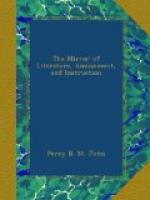The annexed view is of the date 1785, being from the first volume of the Gentleman’s Magazine for that year. The building to the extreme left is part of the market-cross, erected by dean Denton, but replaced some years since by a light brick building. The church is that of St. Mary, one of the three parishes into which Lichfield is divided: it is a modern structure, of the year 1717, and upon the site of the original church, said to have been founded in the year 885. In the extreme distance of the Engraving is seen the Guild or Town Hall, a neat stone edifice, adorned with the city arms, a bas-relief of the cathedral, &c.
* * * * *
ANECDOTE GALLERY.
* * * * *
CLASSICAL ANECDOTES OF CONTINENCE IN MAN.
Many noble instances are recorded by ancient historians of the practice of this noble virtue; but in the reminiscences of our youthful studies, there is no incident that occurs with more freshness to the memory than that of the continence of Scipio Africanus, related by Livy. It appears that the soldiers of Scipio’s army, after the taking of new Carthage, brought before him a young lady of great beauty. Scipio inquiring concerning her country and parents, ascertained that she was betrothed to Allutius, prince of the Celtiberians. He immediately ordered her parents and bridegroom to be sent for. In the meantime he was informed that the young prince was so excessively enamoured of his bride, that he could not survive the loss of her. For this reason, as soon as he appeared, and before he spoke to her parents, he took great care to talk with him. “As you and I are both young,” said he, “we can converse together with greater freedom. When your bride, who had fallen into the hands of my soldiers, was brought before me, I was informed that you loved her passionately; and, in truth, her perfect beauty left me no room to doubt of it. If I were at liberty to indulge a youthful passion—I mean honourable and lawful wedlock, and were not solely engrossed by the affairs of my republic, I might have hoped to have been pardoned my excessive love for so charming a mistress; but as I am situated, and have it in my power, with pleasure I promote your happiness. Your future spouse has met with as civil and modest treatment from me, as if she had been amongst her own parents, who are soon to be yours too. I have kept her pure, in order to have it in my power to make you a present worthy of you and of me.” The magnanimity of his behaviour did not close here, for when the parents of the fair captive brought an immense sum of money to ransom her, they were much surprised at Scipio’s noble conduct, and in the ecstacy of joy and gratitude, they pressed him to accept it as a token of thankfulness. Scipio, unable to resist their importunate solicitations, told them he accepted it; but ordering it to be laid at his feet, he thus addressed Allutius:—“To the portion you are to receive from your father-in-law, I add this, and beg you would accept it as a nuptial present:” thus exhibiting in the whole transaction a rare instance of modesty, disinterestedness, and benevolence, well worthy of imperishable record, as a moral lesson for mankind.




